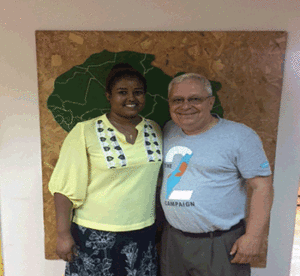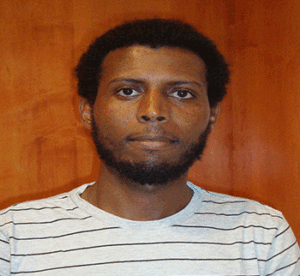Kehase Berhane has been in Canada since June 13, and in the short time he’s lived here, he’s found the adjustment difficult.
Don’t get him wrong. He’s happy he and his family have legal residency status in a peaceful country – unlike when they lived in Israel, where they were asylum seekers from Eritrea with no legal right to remain in the country. And he’s happy that he can leave the country for short periods with no risk that he’ll be barred from returning, as was the case in Israel.
But, in Israel, he was able to start his own apparel business in a matter of days, and his family had a place of their own. In Canada, it’s proven difficult to find an apartment without a credit history and he, his wife and two children have been living with a friend in a single room in a small apartment. As for the future, his job prospects are uncertain.
Berhane is one of hundreds of Eritreans who have emigrated to Canada from Israel in recent years. Berhane had lived in Israel for seven years after fleeing his native Eritrea, where a dispute with his well-connected boss put his life in danger. Even now, he misses Israel and has no hard feelings towards the country.
“I really thank and appreciate and even now I’m missing Israel,” he told The CJN. “The people were very nice.”

Nevertheless, because of his uncertain legal status in the country, he and his wife, Shewit, decided to start a new life in Canada with their children, Yonatan and Selina.
Of the hundreds of privately sponsored Eritrean immigrants from Israel, only two families came under the auspices of JIAS Toronto, or Jewish Immigrant Aid Services, which is a government-designated sponsorship agreement holder. A second Eritrean family sponsored by JIAS arrived shortly after the Berhanes.
In welcoming and settling the new family, JIAS co-ordinates efforts with a group of 15 to 20 volunteers, who aid in the family’s resettlement and integration process, said Lia Kisel, JIAS’s language and settlement director.
Kisel pointed out that despite having lived in Israel, Eritreans coming to Canada still meet the legal definition of refugees – people with a well-founded fear of persecution if they return to their home country.
“Canadian Jews should be concerned about the plight of all refugees. In the global world (in which) we live today, the plight of refugees is something that cannot be dismissed,” she said.
Berhane and his family, who reside in midtown Toronto, were sponsored by Liat King and Aaron Rotenberg.
It is estimated that there are more than 40,000 African asylum seekers in Israel, 30,000 of whom are from Eritrea, a country in east Africa bordered by Ethiopia in the south, Sudan in the north and west, and by the Red Sea to the east.
Along with the Eritreans, Israel currently hosts around 8,000 Sudanese and 2,000 people from other African countries, said Elliot Vaisrub Glassenberg, a Canadian-American-Israeli who co-chairs the group, Right Now: Advocates for Asylum Seekers in Israel.
Almost all of them arrived between 2005 and 2012, fleeing genocide, ethnic cleansing and religious persecution, Glassenberg said.
Most traveled through Sudan, Egypt and the Sinai Peninsula to get to Israel, but the government closed its border to the Sinai in 2012, calling the newcomers “infiltrators” and economic refugees.
In 2013, the government opened the Holot detention centre near Be’er Sheva. The facility can hold as many as 3,300 people who are not allowed to work and who live under a curfew.
Asylum seekers live in Israel with limited rights, according to HIAS, a U.S.-based Jewish non-profit that advocates for refugees. While asylum seekers cannot be deported, they don’t enjoy access to welfare or medical services.
HIAS notes that as a signatory to the UN Refugee Convention, Israel is “legally and morally bound to protect refugees. Unfortunately, at present, Israel is violating some of these protections.”
Meanwhile, Eritreans increasingly see Canada as a viable alternative to the uncertainty of life in Israel. Citing data from Israel’s Population, Immigration and Border Authority, Haaretz reported that in the first half of 2017, 975 Eritrean and Sudanese people left Israel for Canada, compared to 879 in all of 2016.
Daniel Schild, who co-chairs the interfaith outreach committee at Darchei Noam synagogue in Toronto and sits on the board of JSpace Canada, was on a flight from the Jewish state last winter, when he was surprised to find several Eritrean families on board, speaking Hebrew and headed for new lives in Western Canada.
Their situation piqued his interest and, he now calls for community support for African asylum seekers in Israel.
The refugees “went through hell to get to Israel,” and where they were once welcomed when they came in small numbers, a larger wave of arrivals prompted border closures and various measures to encourage them to leave, he said.
The government recently imposed a 20 per cent withholding tax on Africans’ earnings. The funds are returned to them when they leave the country, he said.
Schild said he is working in Toronto with the New Israel Fund of Canada (NIFC), to assist three Eritreans employed by ASSAF, the Aid Organization for Refugees in Israel, who have seen their salaries cut substantially due to the new tax.
Schild and NIFC hope to raise about $5,000 over the next six months, and $10,000 within a year, to counteract the effect of the tax.
It’s not much more than “a little bandage on the problem for three very needy families,” he said.
Amy Block, a member of NIFC’s board, acknowledged that “NIFC is supporting a project in Israel run by ASSAF.
“As Jews and as Canadians, refugee rights and protections are integral aspects of a democratic state,” Block stated.
Schild believes Canadians can do more to help Eritrean asylum seekers.
“There is an immediate need for financial relief, especially for women and at-risk families,” he said. “Our Canadian Jewish community must ensure that Canada’s doors are open to larger numbers of asylum seekers from Israel and to do so, we need more Canadians to sponsor and help integrate newcomers into Canadian life.”
Kisel said the community’s response to Eritrean immigration has been “mixed, as with anything with refugees. There are people who support it, or who don’t. We look at the individual circumstances of families and if they meet the legal definition, we sponsor them.”
King, one of Berhane’s sponsors, said Eritreans who come to Canada don’t generally harbour resentment towards Israel, but they realize they don’t have a future there. She believes that Canadian Jews who sponsor Eritrean refugees are doing Israel a service.
“It’s not bad for Israel. It’s solving a problem,” she said.
“Some say that Israel is not taking care of them as they should, but for whatever reason, they don’t belong (in Israel). Canadians can show our humanity by being the place where they do belong.”
Glassenberg, an oleh (new immigrant to Israel) who is working in Chicago as a shaliach for Habonim Dror, said that “as a Canadian, it makes me proud to see Canada offering refuge and hope to so many refugees in need.
“At the same time, as an Israeli and as a Jew, it is saddening that Israel has not offered basic refuge and basic rights to more than a handful of Sudanese and Eritrean asylum seekers, and forces them to seek safety elsewhere.
“Canada and Israel and Jews on both sides of the ocean must work together to share in the challenges and benefits of refugee resettlement. Hopefully Israel, like Canada, will come to see refugees as an asset and not a burden to building a strong and healthy society, and see refugee resettlement as a vital part of what it means to be a Jewish state.”
Israel’s ambassador to the United Nations, Daniel Danon, told The CJN in a telephone interview from Montreal that, “We opened the gates for people who seek asylum, but unfortunately we saw that many of the people who came to Israel came to improve their lives. And you can understand that. I was in South Sudan a few years ago and I can understand why people come to Israel from countries in Africa.
“I think today we are trying to encourage (them) to go back to Africa, if they can, and, if not, to settle in other places. For us, when you look at Israel today and the issues we have in Israel, I think that what we are doing, and the fact we allowed those people to come in, was very important at the beginning. But if you look at the number today, I think it makes sense to look for the co-operation of other countries, which are stronger, larger, that can help those people.”

Asked if Jews, given their own history as refugees, had a special responsibility to help the thousands of African asylum seekers in Israel, Danon said, “I’m not in the government today, but when I was in the government, I heard different numbers than the numbers you mentioned. Some would say 60,000, some would say 100,000. That’s something you can argue about.
“Even for those people, if you can find them a place where they have better opportunities, it will be a win-win for everybody.”
Dawit Demoz, 30, has lived in Canada for the last year and a half. He resided in Israel for six-and-a-half years before that.
A native of Senafe, a small town in Ertirea, he had been chosen by the government to study microbiology. He was also expected to take political courses to ensure his loyalty to the regime and then to serve as an informant, reporting even on his own family.
It’s not for nothing that Eritrea is called the “North Korea of Africa,” he said.
Rather than inform on his friends and family, he paid a smuggler to get him out of the country. When his attempt to reach Europe failed, he joined 16 other Eritreans who paid smugglers to bring them to the Jewish state.
The journey was fraught with peril and the smugglers tortured and beat them.
“They enjoyed doing that, beating you, torturing you, humiliating you. They know you have nowhere to go,” he said.
Eventually, they made it to Israel and crossed over the border at night. They were soon picked up by Israeli soldiers. “They were nice to us. They gave us water and blankets,” he recalled.
He spent the next three months in prison, being questioned about his reasons for coming there.
“Obviously, I crossed the border to seek asylum. That was my goal,” he said. “I was glad they let me stay. I was not in fear of getting killed like I was in other countries.”
But at the same time, Demoz believes Israel failed to comply with its international obligations.
“I knew I wouldn’t get killed, but no more than that. I didn’t have a future, or a right to any education, health or social benefits,” he said. “Most important, I didn’t have a working visa.”
Eritreans, he said, have to renew their documentation every two months, part of the “continuous pressure” placed on asylum seekers.
Israel “makes life miserable” for Eritreans, in order to compel them to leave, he said, noting that Miri Regev, the country’s minister of culture and sport, once called Africans a cancer in Israeli society, which helped turn public opinion against the asylum seekers.
Today, Demoz has mixed feelings about his experience in Israel.
“I know the Israeli public was really welcoming and generous in the first few years when Eritreans were coming,” he said. “But later, the Israeli government started campaigning against us.”
Demoz began considering a move to Canada in 2014, after he met a Canadian Jew doing volunteer work with Eritrean refugees. The immigration process took two years, but since his arrival, he says he’s “loving it” and that he thinks “Canada is the best country in the world.”
Here in Canada, “I’m trying to be a voice for Eritreans in Israel and advocate for Canadians to sponsor more Eritreans from Israel,” he said. “We all know the Jewish Diaspora loves Israel. At the same time, it makes sense to understand what’s going on with asylum seekers in Israel.”
Asked about how Canadian Jews sponsored Syrian refugees, he said, “I’m impressed with that. But at the same time, they should help refugees in the country they love.”





